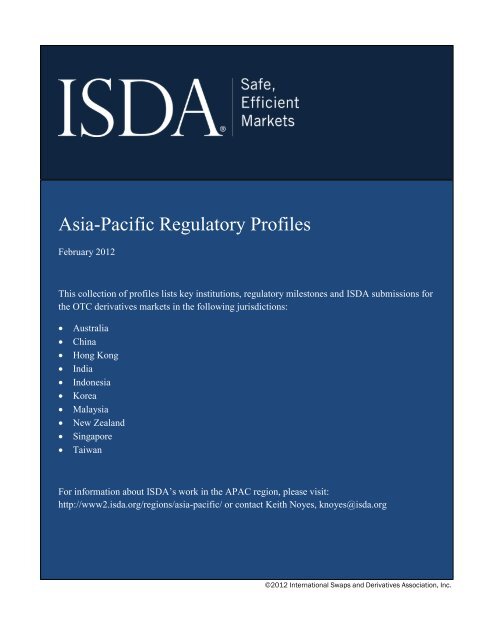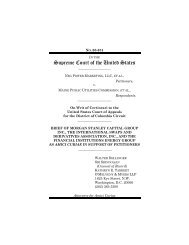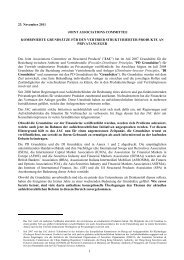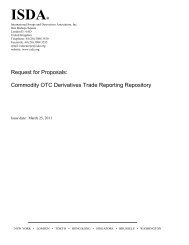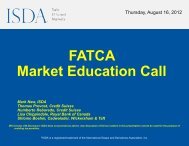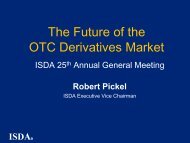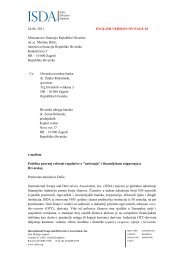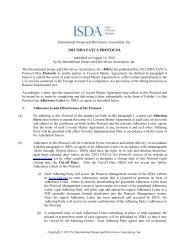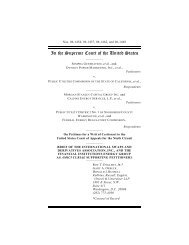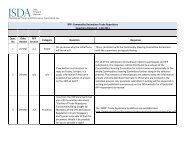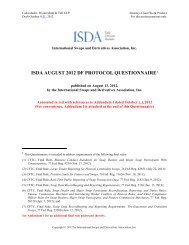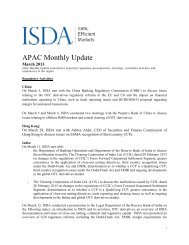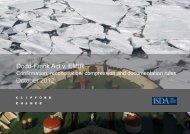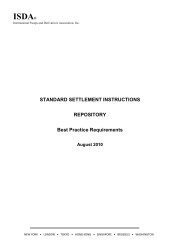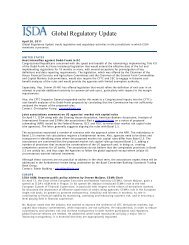Asia-Pacific Regulatory Profiles - ISDA
Asia-Pacific Regulatory Profiles - ISDA
Asia-Pacific Regulatory Profiles - ISDA
Create successful ePaper yourself
Turn your PDF publications into a flip-book with our unique Google optimized e-Paper software.
<strong>Asia</strong>-<strong>Pacific</strong> <strong>Regulatory</strong> <strong>Profiles</strong><br />
February 2012<br />
This collection of profiles lists key institutions, regulatory milestones and <strong>ISDA</strong> submissions for<br />
the OTC derivatives markets in the following jurisdictions:<br />
Australia<br />
China<br />
Hong Kong<br />
India<br />
Indonesia<br />
Korea<br />
Malaysia<br />
New Zealand<br />
Singapore<br />
Taiwan<br />
For information about <strong>ISDA</strong>’s work in the APAC region, please visit:<br />
http://www2.isda.org/regions/asia-pacific/ or contact Keith Noyes, knoyes@isda.org<br />
©2012 International Swaps and Derivatives Association, Inc.
AUSTRALIA<br />
AT A GLANCE<br />
Central Bank: Reserve Bank of Australia (RBA) http://www.rba.gov.au<br />
Bank Regulators: Reserve Bank of Australia (RBA)<br />
Australian Prudential Regulation Authority (APRA) http://www.apra.gov.au<br />
Fin. Mkts Regulator: Australian Securities & Investments Commission (ASIC) http://www.asic.gov<br />
Association: Australian Financial Markets Association (AFMA) http://www.afma.com.au<br />
Master Agreement: <strong>ISDA</strong><br />
Legal Opinions: Netting and collateral opinions by Mallesons Stephen Jaques<br />
Opinion on transactions entered into electronically and electronic records by<br />
Mallesons Stephen Jaques<br />
CCP/TR Status: The Council of Financial Regulators (comprising RBA, APRA, ASIC and the<br />
Treasury) released a discussion paper on ‘Central Clearing of OTC Derivatives in<br />
Australia’ in June 2011 and a consultation paper on ‘Review of Financial Market<br />
Infrastructure Regulation’ in October 2011<br />
Key <strong>Regulatory</strong> Milestones<br />
The Carbon Price Mechanism looks set to start on July 1, 2012. This is one prong of the Clean<br />
Energy Future package announced in July 2011. The Clean Energy Future plan comprises the<br />
introduction of a carbon price and using revenue raised to assist households and businesses,<br />
promoting innovation and investment in renewable energy, encouraging energy efficiency and<br />
creating opportunities in the land sector to cut pollution, improve productivity, sustainability and<br />
resilience. The carbon price will be established by an Emissions Trading Scheme (ETS). The ETS<br />
will commence with a 3-year fixed price period on July 1, 2012 and then move to a flexible pricing<br />
scheme (but with a price ceiling and price floor during the first 3 years of the flexible pricing period).<br />
The Personal Property Securities Register created under the Personal Property Securities Act (PPSA)<br />
was scheduled to be set up by February 1, 2012. All forms of security interests in personal property<br />
must be registered on the Register in order to provide the holder with the best protection and rights.<br />
This will provide a single national register and replace the multiple registers of security interests kept<br />
under many different Commonwealth, State and Territory laws administered by various Australian<br />
government agencies. The next update of the <strong>ISDA</strong> collateral opinion will be an amended and<br />
restated opinion that deals with the PPSA.<br />
On November 19, 2011, the Treasury released a discussion paper on ‘Handling and Use of Client<br />
Money in Relation to Over-the-Counter (OTC) Derivatives Transactions’. The purpose of the paper is<br />
to discuss the issues relating to the holding of client money in connection with OTC derivatives<br />
transactions and to review whether client monies provisions of the Corporations Act 2001 provide<br />
sufficient protection for investors.<br />
APRA released a couple of discussion papers on implementing Basel III – a discussion paper on<br />
Implementing Basel III Liquidity Reforms in Australia on November 16, 2011 and a discussion paper<br />
on Implementing Basel III Capital Reforms in Australia on September 6, 2011.<br />
On October 21, 2011, the Council of Financial Regulators released a consultation paper on ‘Review<br />
of Financial Market Infrastructure Regulation’ that sets out proposals to enhance the supervision of<br />
<strong>ISDA</strong> <strong>Asia</strong>-<strong>Pacific</strong> <strong>Regulatory</strong> <strong>Profiles</strong> February 2012<br />
2
Australia’s critical financial market infrastructure. The proposals include new powers to require<br />
certain systemically-important market infrastructure to have key aspects of their operations located in<br />
Australia and be overseen by 'fit and proper' persons, as well as increased power for regulators to<br />
intervene in the event of infrastructure experiencing substantial difficulties.<br />
The Treasury released a consultation paper on the Exposure Draft – Financial Sector Legislation<br />
Amendment (Close-out Netting Contracts) Bill 2011 on July 1, 2011. The Bill seeks to strike the right<br />
balance between ensuring market confidence in the enforceability of close-out netting contracts and<br />
protecting depositors and insurance holders by imposing a short stay before close-out netting rights<br />
can be enforced. The Bill will address the inconsistency related to close-out netting contracts between<br />
the Banking Act, the Insurance Act and the Life Insurance Act on the one hand and the Payment<br />
Systems and Netting Act on the other hand that was introduced when the former Acts were amended<br />
in 2008.<br />
On June 17, 2011, the Council of Financial Regulators released a discussion paper on ‘Central<br />
Clearing of OTC Derivatives in Australia’. The paper discusses the evolving global landscape for<br />
OTC derivatives and central clearing, the Australian market for OTC derivatives, and a range of<br />
matters to be considered if central clearing in the domestic market is to be established. The paper<br />
argues that where offshore CCPs are clearing domestic markets that are of systemic importance, this<br />
may introduce risks to the Australian financial system that do not currently exist and identifies AUDdenominated<br />
interest rate derivatives as being systemically important to Australia. The Council is<br />
considering whether to make it mandatory for participants such as Australian Authorized Deposittaking<br />
Institutions and Australian Financial Services Licensees to clear AUD-denominated interest<br />
rate derivatives through a domestic CCP.<br />
<strong>ISDA</strong> Submissions (since 2010)<br />
January 20, 2012: <strong>ISDA</strong> submission to the Australian Treasury on consultation pager “Handling and<br />
use of client money in relation to over-the-country derivatives transactions” (not public as of printing)<br />
November 28, 2011: <strong>ISDA</strong> submission to the Treasury on discussion paper ‘Review of Financial<br />
Market Infrastructure Regulation’<br />
August 26, 2011: <strong>ISDA</strong> submission to RBA on discussion paper ‘Central Clearing of OTC<br />
Derivatives in Australia’<br />
August 1, 2011: <strong>ISDA</strong> submission to the Treasury on Financial Sector Legislation Amendment<br />
(Close-out Netting Contracts) Bill 2011<br />
July 30, 2010: <strong>ISDA</strong> (as part of the JAC) submission to ASIC on ‘Review of Disclosure for Capital<br />
Protected Products and Retail Structured or Derivatives Products’<br />
May 26, 2010: <strong>ISDA</strong> submission to the Attorney General on the Exposure Draft of the Personal<br />
Property Securities Regulations 2010<br />
March 16, 2010: <strong>ISDA</strong> submission to the Treasury on the Financial Sector Legislation Amendment<br />
(Prudential Refinements and Other Measures) Bill 2010 (Commonwealth)<br />
<strong>ISDA</strong> <strong>Asia</strong>-<strong>Pacific</strong> <strong>Regulatory</strong> <strong>Profiles</strong> February 2012<br />
3
CHINA<br />
AT A GLANCE<br />
Central Bank: People’s Bank of China (PBOC) http://www.pbc.gov.cn<br />
Bank Regulator: China Banking <strong>Regulatory</strong> Commission (CBRC) http://www.cbrc.gov.cn<br />
Securities Regulator: China Securities <strong>Regulatory</strong> Commission (CSRC) http://www.csrc.gov.cn<br />
Insurance Regulator: China Insurance <strong>Regulatory</strong> Commission (CIRC) http://www.circ.gov.cn<br />
Other Regulators: State Administration of Foreign Exchange (SAFE) http://www.safe.gov.cn<br />
State-owned Assets Supervision and Administration Commission of the State<br />
Council (SASAC) http://www.sasac.gov.cn<br />
Association: National Association of Financial Market Institutional Investors (NAFMII, a self<br />
regulatory organization on China’s interbank market)<br />
Master Agreement: NAFMII Master Agreement for onshore currency, rate, bond, credit and gold<br />
trades, <strong>ISDA</strong> Master Agreement for cross border trades<br />
Legal Opinions: N/A<br />
CCP/TR Status: Shanghai Clearing House (SHCH) was established in 2009 to provide clearing<br />
services for financial market participants in China. According to the authorization<br />
of PBOC, SHCH will provide centralized and standardized clearing services for<br />
spot and derivatives transactions in RMB and foreign currencies as well as RMB<br />
cross-border transactions approved by PBOC.<br />
Key <strong>Regulatory</strong> Milestones<br />
SAFE issued a circular on November 11, 2011 which allows banks in China to offer RMB/FX<br />
combined options to clients. According to the circular, “RMB/FX combined options” means two<br />
European risk reversal options sold and purchased by a client concurrently, both of which share the<br />
same currency, term and notional amount. The circular provides that the option fee of the option sold<br />
by the client must not be higher than that of the option it purchases. The circular requires a bank to<br />
verify the underlying commercial transaction and ensure that the client complies with the hedging<br />
principle when offering RMB/FX combined options.<br />
CBRC issued Regulations on the Sale of Wealth Management Products by Commercial Banks on<br />
August 28, 2011 (the “Regulations”). The Regulations, which came into effect on January 1, 2012,<br />
apply to the sale by commercial banks of in-house designed wealth management products (including<br />
retail structured products) to th individual clients (including private banking clients and high-net<br />
worth individuals) or institutional clients. The Regulations set out detailed rules concerning the<br />
marketing activities and reporting requirements applicable to those products. The Regulations are the<br />
most comprehensive rules that CBRC has ever issued regarding distribution of wealth management<br />
products, and should prevail over other rules issued by CBRC previously.<br />
In August 2011, CBRC sought public opinion on the draft capital rules which introduce the Basel 3<br />
guidelines. CBRC's aim is to bring the banking regulatory framework in-line with the international<br />
standards, promote the banking sector's development and to maintain the long-term viability of the<br />
banking sector. CBRC will take into account the international standards and national practice in its<br />
implementation process.<br />
The Interim Measures for the Supervision and Administration of Overseas State-owned Assets of<br />
Central State-owned Enterprises (the “Measures”) issued by SASAC came into effect on July 1, 2011.<br />
<strong>ISDA</strong> <strong>Asia</strong>-<strong>Pacific</strong> <strong>Regulatory</strong> <strong>Profiles</strong> February 2012<br />
4
The Measures govern the overseas investments of central state-owned enterprises (Central SOEs) and<br />
their subsidiaries and regulate the business activities of the offshore subsidiaries of the Central SOEs.<br />
Article 14 of the Measures provides that a Central SOE should centrally manage its financial<br />
derivative business, clarify decision-making process and authorization and operational procedures,<br />
and specify annual trade volume, trade authority and trading process which should be filed with or<br />
approved by SASAC according to relevant rules. Article 14 further provides that overseas financial<br />
derivative business (such as futures, options, forwards and swaps) should strictly comply with the<br />
hedging requirement and speculative activities are prohibited.<br />
On June 22, 2011, NAFMII held its first working team meeting for the revision of the definition of<br />
the China Inter-bank Market Financial Derivatives Transaction Master Agreement (also known as the<br />
NAFMII Master Agreement). The meeting determined the revision should meet four requirements: 1)<br />
to serve the needs of developing the Chinese financial derivatives market; 2) to serve the needs of the<br />
supervisory authorities to regulate the market; 3) to serve the needs of RMB to “go out”; and 4) to<br />
adhere to the Chinese characteristics and conform to the Chinese expression habits.<br />
On May 4, 2011, CSRC issued the Guidelines on Participation by Qualified Foreign Institutional<br />
Investors in Stock Index Futures (the “Guidelines”) which came into effect on the same day. The<br />
Guidelines govern the trading of stock index futures listed on the China Financial Futures Exchange<br />
(CFFEx) by QFIIs. Under the Guidelines, QFIIs are only permitted to trade stock index futures for<br />
hedging purposes.<br />
On April 29, 2011, CSRC issued the Rules on Investment Scope of Securities Companies’ Proprietary<br />
Securities Business (the “Rules”) which came into effect on June 1. The Rules set out the eligible<br />
investment products which a securities company in China may invest for its own account. The<br />
eligible products include: 1) securities traded on the domestic exchanges; 2) debt securities traded on<br />
the domestic inter-bank market and 3) securities which have been approved by or registered with<br />
CSRC and traded over the counter of domestic financial institutions. Financial derivatives are not on<br />
the approved product list.<br />
On January 30, 2011 SAFE issued a circular to allow banks to trade RMB/FX cross currency interest<br />
rate swaps (currency swaps) for corporate clients, in a move to help corporations hedge against<br />
exchange rate risks. Under the circular, which came into effect on March 1, banks can determine the<br />
currencies, terms and interest rates under the swap contracts. However, interest rates offered must be<br />
in line with China's central bank's regulations on deposit and loan rates.<br />
CBRC issued the revised Provisional Administrative Rules Governing Derivatives Activities of<br />
Banking Financial Institutions (the “Revised Derivatives Rules”) on January 5, 2011. The Revised<br />
Derivatives Rules divide derivatives transactions into two categories: hedging transactions and nonhedging<br />
transactions. Hedging transactions consist of transactions a financial institution enters into<br />
for the purpose of hedging its own assets or liabilities. Non-hedging transactions include proprietary<br />
transactions entered into for profit making purposes, market making activities and transactions<br />
conducted on behalf of clients (including hedging trades related to the client trades). According to the<br />
Revised Derivatives Rules, a banking financial institution shall allocate risk capital for its derivative<br />
transactions based on its exposure and the risk capital allocated can not exceed three percent of the<br />
core capital of the bank. Under the Revised Derivatives Rules, there are two types of licenses for<br />
which banks may apply: "basic" and "ordinary". A basic license holder can only enter hedging<br />
transactions and an ordinary license holder can enter into both hedging and non-hedging transactions.<br />
On October 29, 2010 NAFMII published the Guidelines for a Pilot Credit Risk Mitigation Business in<br />
the Inter-bank Market (the “CRM Guidelines”). The CRM Guidelines introduce two types of credit<br />
<strong>ISDA</strong> <strong>Asia</strong>-<strong>Pacific</strong> <strong>Regulatory</strong> <strong>Profiles</strong> February 2012<br />
5
derivatives to China’s domestic market - Credit Risk Mitigation Agreements (CRMA) and Credit<br />
Risk Mitigation Warrants (CRMW). The CRM Guidelines categorize the participants of the credit<br />
derivatives market into three types, according to the participant’s registered capital, relevant trading<br />
experience/qualifications and risk control systems, etc. The CRM Guidelines also include various<br />
rules about issuance of CRMW.<br />
CIRC issued a Notice on July 14, 2010 to allow insurance groups (holding) companies, insurance<br />
companies and insurance asset management companies to carry out interest rate swaps in China.<br />
<strong>ISDA</strong> Submissions (Since 2010)<br />
January 17, 2012: <strong>ISDA</strong> submission to China’s State Administration of Foreign Exchange on the<br />
Notice on Banks’ RMB FX Combined Option Business. Submission is not public.<br />
May 26, 2011: <strong>ISDA</strong> submission to CBRC on the exposure draft of the circular on risk management<br />
of credit derivatives transactions. The CBRC was also planning to publish Chinese definitions for<br />
onshore credit derivatives products. <strong>ISDA</strong> has offered to help the CBRC draft the Chinese definitions.<br />
Submission is not public.<br />
February 21, 2011: <strong>ISDA</strong> submission to CBRC on the revised Provisional Administrative Rules<br />
Governing Derivatives Activities of Banking Financial Institutions<br />
January 14, 2011: Joint Associations Committee (JAC) submission to CBRC on the draft Regulations<br />
governing Sales of Wealth Management Products by Commercial Banks. Submission is not public.<br />
May 4, 2010: Second <strong>ISDA</strong> submission regarding index futures trading by the Qualified Foreign<br />
Institutional Investors<br />
April 15, 2010: First <strong>ISDA</strong> submission to the CSRC and CFFEX regarding index futures trading by<br />
the Qualified Foreign Institutional Investors<br />
<strong>ISDA</strong> <strong>Asia</strong>-<strong>Pacific</strong> <strong>Regulatory</strong> <strong>Profiles</strong> February 2012<br />
6
HONG KONG<br />
AT A GLANCE<br />
Central Bank: Hong Kong Monetary Authority (HKMA) http://www.hkma.gov.hk<br />
Bank Regulator: HKMA<br />
Securities <strong>Regulatory</strong>: Securities and Futures Commission (SFC) http://www.sfc.hk<br />
Other Regulators: Financial Services and Treasury Bureau (FSTB) http://www.fstb.gov.hk<br />
Association: Treasury Markets Association (TMA) http://www.tma.org.hk<br />
Master Agreement: <strong>ISDA</strong><br />
Legal Opinions: Netting and collateral opinions by Allen & Overy; Opinion on transactions entered<br />
into “electronically” and electronic records by Clifford Chance<br />
CCP/TR Status: On December 10, 2010 HKMA, SFC and HKEx announced the plan to develop a<br />
trade repository and a central counterparty for OTC derivatives transactions.<br />
HKMA will run the trade repository, while HKEx will run the CCP. Both will be<br />
ready by the end of 2012, and initial product coverage will include interest rate<br />
swaps and non-deliverable forwards.<br />
Reporting to local trade repository (TR) is expected to be effective on January 1,<br />
2013 for Interest Rates Swaps (Basis Swaps, Floating vs Fixed, Overnight Index<br />
Swaps and FX Non-Deliverable Forwards. The local TR most likely will apply<br />
international standards (e.g. global LEI), and accept data sent via global trade<br />
repositories or confirmation matching platform. Transactions are required to be<br />
backloaded. The reporting details are expected to be finalized in the first half of<br />
2012.<br />
Key <strong>Regulatory</strong> Milestones<br />
HKMA and SFC issued a joint consultation paper on the proposed regulatory regime for Hong<br />
Kong’s over-the-counter derivatives market on October 17, 2011. The joint consultation paper sets<br />
out the HKMA’s and SFC’s current thinking on how the regime might be cast given the present status<br />
of the global reform efforts. In brief, the main proposals in the consultation paper are as follows:<br />
1. The proposed regime will be set out in the Securities and Futures Ordinance (SFO), and will be<br />
jointly overseen and regulated by the HKMA and SFC.<br />
2. OTC derivatives transactions will have to be reported to the trade repository, which is being set<br />
up by the HKMA. This reporting obligation will initially apply only to certain interest rate swaps<br />
(IRS) and non-deliverable forwards (NDF), but will subsequently be extended to other product<br />
classes (such as equity derivatives and other types of interest rate derivatives) after further market<br />
consultation.<br />
3. Standardized OTC derivatives transactions will have to be centrally cleared through a designated<br />
CCP. This mandatory clearing obligation will also initially be limited to only certain IRS and<br />
NDF, and subsequently extended to other product classes after further market consultation;<br />
4. Non-AI entities that engage in OTC derivatives activities (other than as end-users) will be<br />
required to be licensed for a new Type 11 regulated activity under the SFO;<br />
5. Large players who are not regulated by the HKMA or the SFC may be subject to certain<br />
obligations and requirements, such as producing information regarding their OTC derivatives<br />
activities, and reducing their OTC derivatives positions, if so requested by the SFC in extreme<br />
situations.<br />
<strong>ISDA</strong> <strong>Asia</strong>-<strong>Pacific</strong> <strong>Regulatory</strong> <strong>Profiles</strong> February 2012<br />
7
On July 14, 2011, TMA convened a meeting on the development of a CCP and trade repository in<br />
Hong Kong. The meeting concluded with the formation of sub-groups to address the development of<br />
a local repository, a local CCP and the regulatory framework for the OTC derivatives market in Hong<br />
Kong.<br />
The Securities and Futures and Companies Legislation (Structured Products Amendment) Ordinance<br />
2011 (the Amendment Ordinance) (the “Amendment Ordinance”) was gazetted on May 13, 2011 and<br />
took effect on the same day. The Amendment Ordinance transfers the regulation of public offers of<br />
structured products in the form of shares or debentures from the prospectus regime of Companies<br />
Ordinance (CO) to the regime for public offers of investments under the Securities and Futures<br />
Ordinance (SFO). The Amendment Ordinance was the result of a two-month consultation conducted<br />
in 2009, and was part of the regulatory reforms carried out by the SFC after the Lehman minibond<br />
events.<br />
Receivers from PwC announced on March 28, 2011 that they had reached a conditional agreement<br />
with Lehman Brothers Special Financing Inc. which was expected to result in most of the minibond<br />
investors receiving more than 80 percent of their original investment from the underlying collateral.<br />
HKMA issued a Circular on the implementation of Basel III on January 26, 2011. HKMA will follow<br />
the timeline proposed by the Commission which includes a transition period from January 1, 2013 to<br />
full implementation by January 1, 2019. The implementation of Basel III will require the amendment<br />
of the Banking Ordinance, Banking (Capital) Rules and Banking (Disclosure) Rules. To meet the first<br />
deadline, HKMA will introduce amendments in the 2011-2012 legislative sessions, and will allow<br />
HKMA time to develop their supervisory guidelines.<br />
On July 9, 2010, FSTB issued consultation conclusions on the Consultation Paper on the Review of<br />
Corporate Rescue Procedure Legislative Proposals. In the conclusions, FSTB proposes to remove the<br />
general prohibition against set-off. Regarding the exempted financial contracts, FSTB accepted<br />
<strong>ISDA</strong>’s suggestions and agreed that the exemption list approach should be retained and the list of<br />
contracts to be included should be updated in the light of market developments since the insurance of<br />
the Bill. FSTB also concluded that the revised list may be introduced in the form of subsidiary<br />
legislation to facilitate further updates in the future. <strong>ISDA</strong> will continue assisting FSTB in revising<br />
and updating the list of exempted derivatives transactions.<br />
On May 28, 2010, SFC published Consultation Conclusions on Proposals to Enhance Protection for<br />
the Investing Public (Consultation Conclusions). The document announces a package of measures to<br />
strengthen the regulatory regime governing the sale of investment products in Hong Kong.<br />
<strong>ISDA</strong> Submissions (since 2010)<br />
December 6, 2011: <strong>ISDA</strong> submission to HKMA on the report on consultation on logistical and<br />
technical arrangements for reporting to the Hong Kong trade repository<br />
November 30, 2011: <strong>ISDA</strong> submission to HKMA and SFC on the consultation paper on the proposed<br />
regulatory regime for Hong Kong’s over-the-counter derivatives market<br />
July 8, 2011: <strong>ISDA</strong> submission to HKMA on the Conceptual Framework of the Trade Repository.<br />
Submission is not public.<br />
December 2, 2010: JAC submission to the Bills Committee on the Securities and Futures and<br />
Companies Legislation (Structured Products Amendment) Bill<br />
January 27, 2010: <strong>ISDA</strong> submission in response to the Consultation Paper on the Review of<br />
Corporate Rescue Legislative Proposals<br />
<strong>ISDA</strong> <strong>Asia</strong>-<strong>Pacific</strong> <strong>Regulatory</strong> <strong>Profiles</strong> February 2012<br />
8
INDIA<br />
AT A GLANCE<br />
Central Bank: Reserve Bank of India (RBI) http://www.rbi.org.in<br />
Bank Regulator: Reserve Bank of India (RBI)<br />
Securities/Futures<br />
Regulator: Securities and Exchange Board of India (SEBI) http://www.sebi.gov.in<br />
Other Regulator: Forward Markets Commission (FMC) http://www.fmc.gov.in<br />
Associations: Fixed Income Money Market and Derivatives Association (FIMMDA)<br />
Master Agreement: <strong>ISDA</strong><br />
Foreign Exchange Dealers' Association of India (FEDAI)<br />
Primary Dealers Association of India (PDAI)<br />
Legal Opinions: Netting and collateral opinions by Juris Corp<br />
Opinion on transactions entered into electronically and electronic records by Juris<br />
Corp<br />
CCP/TR Status: Clearing Corporation of India Ltd (CCIL) clears inter-dealer INR FX spots and<br />
forwards, and is expected to launch inter-dealing clearing for INR Interest Rate<br />
Swaps (IRS) and Forward Rate Agreements (FRA) in 2012.<br />
CCIL provides a trade reporting platform for inter-dealer INR IRS and FRA and<br />
CDS. This should be further expanded in 2012 to cover INR FX and client trades.<br />
RBI’s Working Group in its Report of May 23, 2011 recommended that CCIL be<br />
the designated repository for interest rate and forex derivative transactions.<br />
Key <strong>Regulatory</strong> Milestones<br />
RBI’s Guidelines on Introduction of CDS for Corporate Bonds (CDS Guidelines) were issued on May<br />
23, 2011 and came into effect on December 1, 2011. Only single-name INR CDS on Indian-resident<br />
corporates are allowed. There are a number of other constraints on what CDS can be written. While<br />
Restructuring is allowed, this is a modified version that departs significantly from the international<br />
market definition of Restructuring. The CDS Guidelines creates two categories of participants –<br />
market-makers and users. Currently, only commercial banks and primary dealers that fulfill certain<br />
eligibility norms are allowed to be market-makers. Commercial banks, primary dealers, non-banking<br />
financial companies, mutual funds, insurance companies, housing finance companies, provident funds,<br />
listed corporates and foreign institutional investors are allowed to be users. Market-makers can buy or<br />
sell CDS without any underlying position in the bonds. Users can only buy CDS as a hedge for a<br />
bond that they hold and must unwind the CDS (or with the consent of the CDS seller, novate the CDS<br />
to their bond purchaser) within 10 business days of selling the bond. Participants are required to<br />
mark-to-market their CDS positions daily and to margin their CDS positions at least weekly. Marketmakers<br />
are required to report their CDS trades within 30 minutes through CCIL’s trade reporting<br />
platform.<br />
The 2007 Comprehensive Guidelines on Derivatives (Derivatives Guidelines) were amended by RBI<br />
on November 2 and August 2, 2011. The November amendments came into effect on January 1, 2012.<br />
The Derivatives Guidelines describe the types of generic and structured derivative products that can<br />
be offered by market-makers (generally commercial banks and primary dealers). The Derivatives<br />
Guidelines also sets out the requirements that must be complied with by market-makers (including<br />
<strong>ISDA</strong> <strong>Asia</strong>-<strong>Pacific</strong> <strong>Regulatory</strong> <strong>Profiles</strong> February 2012<br />
9
isk management practices, conducting a "user appropriateness" and "product suitability" assessment,<br />
obtaining Board Resolutions from the user, providing term sheets and risk disclosure statements to<br />
the user and making available mark-to-market calculators to the user) before offering derivative<br />
products to users (primarily corporates). The requirements differentiate between the offer of generic<br />
and structured derivative products, being more rigorous where structured derivative products are<br />
concerned.<br />
On December 15, November 23 and May 16, 2011, RBI amended its Comprehensive Guidelines on<br />
Over the Counter (OTC) Foreign Exchange Derivatives and Overseas Hedging of Commodity Price<br />
and Freight Risks (FX Guidelines) issued on December 28, 2010. The FX Guidelines set out the<br />
categories of persons permitted to participate in the OTC foreign exchange derivatives market in<br />
India, the types of products that they can use and the conditions under which they may do so. The FX<br />
Guidelines also set out the circumstances in which residents are permitted to hedge commodity price<br />
and freight risk overseas. The Derivatives Guidelines also apply mutatis mutandis to foreign<br />
exchange derivatives. The part of the FX Guidelines that attract great interest deals with the entry into<br />
foreign exchange derivatives by Authorized Dealer Category I banks (AD Banks) with persons<br />
resident in India that are non-AD Banks under the ‘Contracted Exposures’ or ‘Probable Exposures<br />
based on Past Performance’ routes. In particular, the FX Guidelines restrict the categories of persons<br />
that can engage in cost reduction structures and the types of cost reduction structures that are<br />
permitted. The FX Guidelines also clarify the nature and extent of the due diligence that the AD<br />
Banks are required to undertake to verify that the user has the underlying exposure.<br />
The revisions to the FX Guidelines and Derivatives Guidelines were not unexpected given the spate<br />
of derivatives litigation post the global financial crisis, including the Public Interest Litigation petition<br />
that was filed in the Orissa High Court and that is still pending before the Supreme Court. RBI had<br />
also imposed penalties on 19 banks in April 2011 and another 2 banks in September 2011 for noncompliance<br />
with its instructions on derivatives.<br />
On May 23, 2011, RBI’s Working Group Report on Reporting of OTC Interest Rate and Forex<br />
Derivatives was published. The Working Group noted that India has had arrangements for reporting<br />
of various derivative transactions ranging from summary information to transaction level data.<br />
However, there is a need for consolidation of the reporting arrangements with a view to improving the<br />
transparency of the market, facilitating its comprehensive monitoring by regulators and improving the<br />
efficiency of the post-trade processing infrastructure. The Working Group recommended that CCIL<br />
be the designated repository for interest rate and forex derivative transactions but that CCIL should,<br />
in due course, consider the economic viability of housing the repository services in a separate<br />
subsidiary so as to segregate the repository activity from its clearing and settlement activity to ensure<br />
better governance and compliance with standards.<br />
The landscape for the financial services industry is expected to evolve over the coming years. The<br />
Financial Sector Legislative Reforms Commission (FSLRC) was set up by the Ministry of Finance to<br />
review, harmonize, modernize and streamline all financial sector laws to cater to the requirements of<br />
India’s economy in tune with the changing financial landscape in an inter-connected financial world.<br />
The FSLRC’s report is due by March 2013. Draft Guidelines for the issuance of new private sector<br />
banking licenses were released by RBI on August 29, 2011 following upon its Discussion Paper of<br />
August 2010. The RBI Working Group Report on Introduction of Financial Holding Company<br />
Structure was published on May 23, 2011 and on January 21, 2011, the RBI released its Discussion<br />
Paper on the Presence of Foreign Banks in India. Given the mandate of the FSLRC, it will be<br />
opportune and <strong>ISDA</strong> intends to make a submission on close-out netting enforceability and bilateral<br />
margining, particularly in view of RBI’s recent reiteration in its Prudential Norms circular of August<br />
11, 2011 that the “legal position regarding bilateral netting is not unambiguously clear”.<br />
<strong>ISDA</strong> <strong>Asia</strong>-<strong>Pacific</strong> <strong>Regulatory</strong> <strong>Profiles</strong> February 2012<br />
10
RBI issued its Circular on Implementation of the Advanced Measurement Approach (AMA) for<br />
Calculation of Capital Charge for Operational Risk on April 27, 2011. Banks that are calculating<br />
operational risk charge under the Basic Indicator Approach (BIA) or the Standardized Approach<br />
(TSA)/Alternative Standardized Approach (ASA) can apply for migration to the AMA method for<br />
operational risk from April 1, 2012 onwards.<br />
<strong>ISDA</strong> Submissions (since 2010)<br />
March 8, 2011: <strong>ISDA</strong> submission to RBI on Draft Guidelines on Credit Default Swaps for Corporate<br />
Bonds<br />
October 8, 2010: <strong>ISDA</strong> submission to the Ministry of Finance on Report of the Working Group on<br />
Foreign Investment in India<br />
October 4, 2010: <strong>ISDA</strong> submission to RBI on Draft Report of the Internal Group on Introduction of<br />
Credit Default Swaps for Corporate Bonds<br />
June 22, 2010: <strong>ISDA</strong> submission to the Ministry of Finance Working Group on Foreign Investment in<br />
India<br />
June 11, 2010: <strong>ISDA</strong> submission to the Ministry of Finance Working Group on Foreign Investment in<br />
India<br />
March 9, 2010: <strong>ISDA</strong> submission to the Ministry of Finance Working Group on Foreign Investment<br />
in India<br />
<strong>ISDA</strong> <strong>Asia</strong>-<strong>Pacific</strong> <strong>Regulatory</strong> <strong>Profiles</strong> February 2012<br />
11
INDONESIA<br />
AT A GLANCE<br />
Central Bank: Bank Indonesia (BI) http://www.bi.go.id<br />
Bank Regulator: BI but scheduled to be transferred to OJK by end-2013<br />
Securities Regulator: Bapepam-LK http://www.bapepam.go.id but scheduled to be transferred to OJK<br />
by end-2012<br />
Fin. Mkts Regulator: Otoritas Jasa Keuangan (OJK)<br />
Associations: Perbanas<br />
Foreign Banks Association of Indonesia (FBAI)<br />
Legal Opinions: Netting and collateral opinions by ABNR<br />
Master Agreement: <strong>ISDA</strong> with local language translation appended<br />
CCP/TR Status: No announced plans<br />
Key <strong>Regulatory</strong> Milestones<br />
The law setting up the OJK was finally passed in October 2011. Like the UK FSA, the OJK is an<br />
independent body set up to regulate and supervise the financial services industry. OJK is supposed to<br />
take over the regulation and supervision of capital markets and non-banking financial institutions<br />
from Bapepam-LK by end-2012 and the banking supervisory function from BI by end-2013. The OJK<br />
law also creates a coordination forum on financial systems, comprising the Minister of Finance, the<br />
BI Governor, the Chairman of the Board of Commissioners of the OJK and the Chairman of the<br />
Indonesia Deposit Insurance Corporation. In this forum, the OJK is required to monitor and evaluate<br />
the stability of the financial system and communicate its findings to other institutions. Given that the<br />
passage of the OJK law itself was much delayed, it will be interesting to watch how implementation<br />
progresses.<br />
Law No. 7 of 2011 (Currency Law) came into effect on June 28, 2011. The Currency Law (in<br />
particular Articles 21 and 23) creates uncertainty around the use of a currency other than IDR as the<br />
settlement currency or the denomination currency for domestic and cross-border transactions. The<br />
Directorate General of Treasury at the Ministry of Finance published “Sosialisasi Undang-Undang<br />
Nomor 7 Tahun 2011 Tentang Mata Uang” (Socialization Booklet) and together with BI, conducted a<br />
briefing session in December 2011. The Socialization Booklet clarifies that the Currency Law is<br />
limited to transactions that involve physical payment in bank notes and coins. As OTC derivative<br />
transactions rarely involve settlement by physical delivery of bank notes and coins, this would mean<br />
that the Currency Law will not apply to OTC derivatives. However, as the Socialization Booklet does<br />
not have the force of law, concern remains that neither the enforcement agencies nor the courts are<br />
bound by it. Pending legal confirmation of the scope of the Currency Law, it may be prudent to take<br />
steps to try to bring a cross-border OTC derivative transaction within the “international trade<br />
transactions” exemption in Article 21(2) of the Currency Law or to include explicit ‘contracting out’<br />
language to bring a domestic OTC derivative transaction within Article 23(2) (though it should be<br />
noted that the scope of Articles 21(2) and 23(2) are themselves unclear).<br />
BI Regulation No. 12/9/PBI/2010 on Prudential Principles in Conducting Offshore Financial Products<br />
Agency Activities by Commercial Banks came into effect on June 29, 2010. Commercial banks in<br />
Indonesia (including Indonesian branches and subsidiaries of foreign banks) with an FX license can<br />
carry out agency activities for offshore financial products (OFP) only if certain conditions are met.<br />
<strong>ISDA</strong> <strong>Asia</strong>-<strong>Pacific</strong> <strong>Regulatory</strong> <strong>Profiles</strong> February 2012<br />
12
Although an OFP is defined as an “investment instrument issued by foreign issuers”, BI has clarified<br />
that OTC derivatives could be impacted. OFPs can only be offered to non-retail customers. The issuer<br />
of the OFP must be licensed and supervised by a competent authority in the issuer’s home country.<br />
For a non-security OFP, the issuer must have a branch in Indonesia. The bank must carry out an<br />
analysis of the OFP and provide offering materials to the customer in the Indonesian language.<br />
BI Regulation No. 11/26/PBI/2009 on Structured Products came into effect on July 1, 2009. OTC<br />
derivatives fall within this Regulation. Banks must obtain an in-principle approval from BI before<br />
they can offer any structured products. In addition, for non-principal protected structured products,<br />
banks must obtain transaction-type approval from BI. Banks with an FX license can offer structured<br />
products with FX and/or interest rates as underlying. Non-FX banks can only offer structured<br />
products with interest rates as underlying. Foreign currency against IDR structured products are<br />
prohibited. The Regulation imposes restrictions on the types of structured products that can be offered<br />
to different customer categories. There are other business conduct and disclosure requirements such<br />
as a mandatory cooling-off period for non-principal protected structured products and a requirement<br />
that term sheets and agreements be in the Indonesian language.<br />
On July 9, 2009, Law No.24 of 2009 on the National Flag, Language, Seal and Anthem (National<br />
Language Law) came into effect. The National Language Law requires that all agreements involving<br />
an Indonesian party must be in the national language, Bahasa Indonesian. <strong>ISDA</strong> has published<br />
Indonesian translations of the 2002 <strong>ISDA</strong> Master Agreement as well as confirmation templates and<br />
glossaries for certain plain vanilla FX, currency option, interest rate and cross currency swap<br />
transactions.<br />
<strong>ISDA</strong> Submissions (since 2010)<br />
January 17, 2012: <strong>ISDA</strong> submission to the Ministry of Finance and Bank Indonesia on Law No. 7 of<br />
2011 (Currency Law). This submission is not public.<br />
<strong>ISDA</strong> <strong>Asia</strong>-<strong>Pacific</strong> <strong>Regulatory</strong> <strong>Profiles</strong> February 2012<br />
13
KOREA<br />
AT A GLANCE<br />
Central Bank: Bank of Korea (BOK) http://www.bok.or.kr<br />
Bank Regulator: Financial Services Commission (FSC) (policy-making) http://www.fsc.go.kr<br />
Securities Regulators: FSC, FSS<br />
Financial Supervisory Service (FSS) (execution of financial market supervision)<br />
http://english.fss.or.kr<br />
Other Regulators: Ministry of Strategy and Finance (MOSF) http://english.mosf.go.kr<br />
Associations: Korean Financial Industry Association (KOFIA)<br />
Korean Federation of Banks (KFB)<br />
Foreign Banks Association<br />
Master Agreement: <strong>ISDA</strong> (an “<strong>ISDA</strong> Lite” Korean version is commonly used between Korean banks<br />
and domestic corporate for documenting FX transactions but is not mandated)<br />
Legal Opinions: Netting and collateral opinions by Kim & Chang<br />
Opinion on transactions entered into electronically and electronic records by Lee<br />
& Co<br />
CCP/TR Status: FSC published the proposed amendments to Financial Investment Services and<br />
Capital Markets Act (FISCMA) Relating to Central Counterparties in August<br />
2011. Korean Won interest rate swaps are expected to be the first products<br />
cleared, potentially followed by non-deliverable forwards and CDS at a later date.<br />
Key <strong>Regulatory</strong> Milestones<br />
Korea Exchange issued in December 2011 draft clearing rules and procedures for the CCP it will<br />
establish.<br />
FSC submitted the Amendments for CCP legislation to the National Assembly in November<br />
2011. The Amendments had not been voted as of mid-January 2012.<br />
FSC published the proposed amendments to Financial Investment Services and Capital Markets Act<br />
(FISCMA) Relating to Central Counterparties. Under the proposed amendments, a CCP for OTC<br />
derivatives will be set up in time to meet Korea's end-2012 G20 commitment.<br />
Korea passed legislation earlier 2011 to introduce a new tax on non-deposit foreign currency<br />
liabilities held by domestic and foreign banks in Korea. Differentiated levy rates are applied based on<br />
the maturity of non-deposit foreign currency liabilities. The levy was implemented in August 2011.<br />
On June 13, 2010, the MOSF (in a joint statement with the BOK, FSC and FSS) announced it would<br />
introduce new ceilings on FX derivatives positions, aimed at reducing the volatility in capital flows.<br />
The new rules set limits on FX derivatives contracts (including FX forwards, FX swaps, crosscurrency<br />
interest rate swaps and non-deliverable forwards) for domestic banks and branches of<br />
foreign banks. The measures came into effect with a three-month grace period, but banks with an<br />
existing FX derivatives position higher than the new ceilings can maintain their existing positions for<br />
a maximum two years.<br />
<strong>ISDA</strong> <strong>Asia</strong>-<strong>Pacific</strong> <strong>Regulatory</strong> <strong>Profiles</strong> February 2012<br />
14
In June 2010, KOFIA issued Regulations for the Operation of the OTC Derivatives Review<br />
Committee, which reviews certain new types of OTC products. The committee was formally<br />
established on June 1, 2010 and commenced operations on June 13, 2010.<br />
The National Assembly passed the New Product Approval (NPA) bill in the form of an amendment to<br />
the FSCMA on February 18, 2010, along with five other amendments. The NPA bill became effective<br />
in April, and would cease to have effect on December 31, 2011.<br />
FSS distributed new FX risk management guidelines, effective as of January 1, 2010. Under these<br />
guidelines banks have a much greater responsibility to ensure that corporate end users are hedging<br />
real underling exposure rather than speculating. The guidelines contain a new component requiring a<br />
commitment letter prior to trading from corporate clients who convert into professional investors.<br />
These investors' trades cannot exceed a notional amount pre-set by banks. The guidelines cover OTC<br />
FX forwards (including NDFs), FX options and FX swaps.<br />
<strong>ISDA</strong> Submissions (since 2010)<br />
September 19, 2011: <strong>ISDA</strong> submission to FSC on Proposed Amendment to Financial Investment<br />
Services and Capital Markets Act (FISCMA) Relating to Central Counterparty. This submission is<br />
not public.<br />
June 6, 2011: <strong>ISDA</strong> submission to the Ministry of Strategy and Finance (MOSF) on the Foreign<br />
Exchange Prudential-Stability Levy<br />
<strong>ISDA</strong> <strong>Asia</strong>-<strong>Pacific</strong> <strong>Regulatory</strong> <strong>Profiles</strong> February 2012<br />
15
MALAYSIA<br />
AT A GLANCE<br />
Central Bank: Bank Negara Malaysia (BNM) http://www.bnm.gov.my<br />
Bank Regulator: BNM<br />
Fin. Mkts Regulator: Securities Commission, Malaysia (SC) http://www.sc.com.my<br />
Associations: Association of Banks in Malaysia (ABM)<br />
Master Agreement: <strong>ISDA</strong><br />
Malaysian Investment Banking Association (MIBA)<br />
Association of Islamic Banking Institutions Malaysia (AIBIM)<br />
Legal Opinions: Netting and collateral opinions by Shearn Delamore & Co<br />
Opinion on transactions entered into electronically and electronic records by<br />
Shearn Delamore & Co<br />
CCP/TR Status: The CSMA Amendment Act provides the legislative framework for trade reporting<br />
but this will come into force at earliest in October 2013<br />
Key <strong>Regulatory</strong> Milestones<br />
The Capital Markets and Services (Amendment) Act 2011 (CMSA) (except the provision amending<br />
Section 92 of the CMSA) came into force on October 3, 2011. OTC derivatives now constitutes a<br />
regulated activity under the CMSA. However, participants that deal bilaterally on a principal-toprincipal<br />
basis (as would generally be the case for OTC derivatives under an <strong>ISDA</strong> Master Agreement)<br />
would fall within the exemption in Schedule 3 and licensed banks would also fall within the<br />
exemption in Schedule 4. Persons that fall within the Schedule 3 or Schedule 4 exemptions are not<br />
required to obtain a Capital Market Services License (CMSL) from the SC. A person falling within<br />
Schedule 3 is not subject to the business conduct requirements in the CMSA whilst a registered<br />
person under Schedule 4 is subject to the business conduct requirements set out in Section 76(5) to (8)<br />
of the CMSA. Other provisions of the CMSA such as Part V (Market Misconduct and Other<br />
Prohibited Conduct) and the obligation to report trades to a trade repository under Section 107J<br />
applies to both a person falling within Schedule 3 and a person falling within Schedule 4.<br />
BNM’s Revised Guidelines on Product Transparency and Disclosure which took effect on June 30,<br />
2011 requires banks to provide documents to customers in plain language and in the Malay language<br />
if so requested by the customer. While the <strong>ISDA</strong> Master Agreement and related <strong>ISDA</strong> documentation<br />
would be subject to the Guidelines, BNM has acknowledged that it recognizes that it may be<br />
inefficacious for <strong>ISDA</strong> documents to be subject to the plain language and Malay language<br />
requirements. BNM has also confirmed that the aim of the Guidelines is to establish a consistent and<br />
comprehensive disclosure regime for financial service providers in Malaysia when dealing with retail<br />
customers.<br />
The new Perbadanan Insurans Deposit Malaysia (PIDM) or Malaysia Deposit Insurance Act (PIDM<br />
Act) came into operation on December 31, 2010. The new PIDM Act represents a significant<br />
improvement by protecting close-out netting rights under qualified financial agreements once a short<br />
stay period has elapsed without PIDM deciding to transfer the outstanding derivatives positions of the<br />
distressed bank. However, there remain certain issues which militate against close-out netting<br />
enforceability. These issues center around PIDM’s indication that it will impose a stay period of 10<br />
calendar days, the definition of a ‘qualified financial agreement’ and the criteria to be a ‘qualified<br />
<strong>ISDA</strong> <strong>Asia</strong>-<strong>Pacific</strong> <strong>Regulatory</strong> <strong>Profiles</strong> February 2012<br />
16
third party’ to whom outstanding derivative positions of the distressed bank can be transferred by<br />
PIDM.<br />
<strong>ISDA</strong> Submissions (since 2010)<br />
November 3, 2011: <strong>ISDA</strong> submission to SC on Capital Markets and Services (Amendment) Act 2011<br />
September 23, 2011: <strong>ISDA</strong> submission to SC on Capital Markets and Services (Amendment) Bill<br />
2011<br />
September 15, 2011: <strong>ISDA</strong> submission to PIDM regarding Consultation Paper on Criteria for<br />
Qualified Third Party<br />
December 17, 2010: <strong>ISDA</strong> submission to BNM on Revised Guidelines on Product Transparency and<br />
Disclosure<br />
July 30, 2010: <strong>ISDA</strong> submission to PIDM on Consultation Paper on Proposed Amendments to the<br />
Malaysia Deposit Insurance Corporation Act 2005 Affecting Certain Financial Transactions<br />
April 30, 2010: <strong>ISDA</strong> submission to SC on Public Consultation Paper on Review of Sophisticated<br />
Investors and Sales Practices for Capital Market Products.<br />
<strong>ISDA</strong> <strong>Asia</strong>-<strong>Pacific</strong> <strong>Regulatory</strong> <strong>Profiles</strong> February 2012<br />
17
NEW ZEALAND<br />
AT A GLANCE<br />
Central Bank: Reserve Bank of New Zealand (RBNZ) http://www.rbnz.govt.nz<br />
Bank Regulator: RBNZ<br />
Fin. Mkts Regulator: Financial Markets Authority (FMA) http://www.fma.govt.nz<br />
Bank Association: New Zealand Bankers Association (NZBA)<br />
Master Agreement: <strong>ISDA</strong><br />
Legal Opinions: Netting and collateral opinions by Bell Gully<br />
CCP/TR Status: No announced plans.<br />
Key <strong>Regulatory</strong> Milestones<br />
The Financial Markets Conduct legislation is expected to be enacted in 2012. It represents the most<br />
comprehensive reform of New Zealand's securities and financial markets law in decades. OTC<br />
derivatives will, for the first time, become a regulated financial product. However, dealings between<br />
wholesale market participants will largely be exempted.<br />
On November 8, 2011 RBNZ released a consultation paper on Implementation of Basel III Capital<br />
Adequacy Requirements in New Zealand.<br />
<strong>ISDA</strong> Submissions (since 2010)<br />
September 6, 2011: <strong>ISDA</strong> submission to the Ministry of Economic Development (MED) on Financial<br />
Markets Conduct Bill<br />
August 20, 2010: <strong>ISDA</strong> submission to MED on discussion paper ‘Review of Securities Law’<br />
<strong>ISDA</strong> <strong>Asia</strong>-<strong>Pacific</strong> <strong>Regulatory</strong> <strong>Profiles</strong> February 2012<br />
18
SINGAPORE<br />
AT A GLANCE<br />
Central Bank: Monetary Authority of Singapore (MAS) http://www.mas.gov.sg<br />
Bank Regulator: MAS<br />
Securities/Futures<br />
Regulator: MAS<br />
Associations: Singapore Foreign Exchange Markets Committee (SFEMC)<br />
Master Agreement: <strong>ISDA</strong><br />
Association of Banks, Singapore (ABS)<br />
Singapore Investment Banking Association (SIBA)<br />
Legal Opinions: Netting and collateral opinions by Allen & Gledhill<br />
Opinion on transactions entered into “electronically” and electronic records by<br />
Allen & Gledhill<br />
CCP/TR Status: SGX launched the first platform in <strong>Asia</strong> for central clearing of OTC derivatives in<br />
November 2010. The first product to be cleared were US and SGD interest rate<br />
swaps. This was extended to non-deliverable <strong>Asia</strong>n Foreign Exchange Forwards in<br />
October 2011. The currencies cleared are CNY, IDR, INR, KRW, MYR, PHP and<br />
TWD.<br />
MAS is expected to publish its consultation papers on clearing and trade<br />
reporting requirements in 2012.<br />
Key <strong>Regulatory</strong> Milestones<br />
The final plank of the new regulatory regime for specified investment products (SIPs) (any<br />
investment product other than those on a list of Excluded Investment Products (EIPs) – EIPs are less<br />
complex products which are already established in the Singapore market and generally well<br />
understood by retail customers) came into effect on January 1, 2012. The final plank requires<br />
financial advisers to conduct a Customer Knowledge Assessment (in the case of unlisted SIPs) and a<br />
Customer Account Review (in the case of listed SIPs) prior to a sale to assess whether the customer<br />
has the relevant knowledge or experience to understand the risks and features of the product. The new<br />
regime was implemented following MAS’ January 2010 consultation paper and MAS’ response on<br />
October 21, 2010 to the feedback it received. The new regime applies where the products are sold to<br />
retail customers who are natural persons. The other planks of the new regime requires ongoing<br />
disclosure requirements to be made for unlisted debentures, a mandatory cooling-off period of 7 days<br />
for unlisted debentures (that are not exempt from prospectus requirements) with tenures longer than 3<br />
months, a Product Highlights Sheet complying with specific prescribed requirements to be lodged<br />
where the offer of the SIP is made in or accompanied by a prospectus, and representatives dealing in<br />
or advising on SIPs to pass additional examinations on product knowledge and analysis.<br />
The Banking (Amendment) Regulations 2011 came into operation on February 14, 2011. The<br />
amendment introduces Regulations 7A and 23G and allows banks in Singapore to carry on<br />
businesses which are related or complementary to the bank’s core financial business, but do not<br />
clearly satisfy the legal criteria of being financial or incidental to financial business under Section 30<br />
of the Banking Act, without the need for prior prescription by class or specific case-by-case approval<br />
by MAS.<br />
<strong>ISDA</strong> <strong>Asia</strong>-<strong>Pacific</strong> <strong>Regulatory</strong> <strong>Profiles</strong> February 2012<br />
19
Banks incorporated in Singapore will be required to meet the Basel III minimum capital adequacy<br />
ratio (CAR) standards by January 1, 2013 ahead of Basel’s January 2015 timeline. Banks will be<br />
required to meet higher standards by January 1, 2015 - Common Equity Tier 1 CAR will be increased<br />
from 4.5% to 6.5% and Tier 1 CAR will be increased from 6% to 8%. MAS’ existing requirement for<br />
Total CAR of 10% (which is higher than Basel III’s 8%) will remain unchanged. Additionally, there<br />
will be a capital conservation buffer of 2.5% to be comprised of Common Equity Tier 1. This buffer<br />
will be phased in from January 1, 2016 to January 1, 2019. The new eligibility criteria for regulatory<br />
capital will also be phased in from January 1, 2014 to January 1, 2018. These requirements will apply<br />
to both the bank-group and bank-solo levels.<br />
<strong>ISDA</strong> Submissions (since 2010)<br />
March 12, 2010: <strong>ISDA</strong> response to the MAS Consultation Paper on the Review of the <strong>Regulatory</strong><br />
Regime Governing the Sale and Marketing of Unlisted Investment Products<br />
<strong>ISDA</strong> <strong>Asia</strong>-<strong>Pacific</strong> <strong>Regulatory</strong> <strong>Profiles</strong> February 2012<br />
20
TAIWAN<br />
AT A GLANCE<br />
Central Bank: Central Bank of China (CBC) http://www.cbc.gov.tw<br />
Bank Regulator: Banking Bureau of the Financial Supervisory Commission (FSC)<br />
http://www.banking.gov.tw<br />
Securities Regulator: Securities and Futures Bureau of the FSC http://www.sfb.gov.tw<br />
Other Regulators: Insurance Bureau of the FSC http://www.ib.gov.tw<br />
GreTai Securities is a GSE that monitors trading volumes and advises Taiwan’s<br />
authorities http://www.otc.org.tw<br />
Associations: Trust Association of the Republic of Taiwan (TAROC)<br />
Taiwan Financial Services Roundtable (TFSR)<br />
Legal Opinions: Netting and collateral opinions by Russin & Vecchi<br />
Master Agreement: <strong>ISDA</strong><br />
CCP/TR Status: FSC mandated Gretai Securities Market to establish a local trade repository.<br />
Key <strong>Regulatory</strong> Milestones<br />
Taiwan’s FSC has mandated Gretai Securities Market to establish a local trade repository. Financial<br />
institutions are required to report their trades to a local trade repository under a phased approach.<br />
Effective on April 1, 2012 (Phase 1), NDF, FX Swap, Vanilla IRS, TWD Equity, and Structured<br />
Deposit will be required (an FI can defer the reporting of its overseas branch’s transactions until the<br />
next phase). Effective on December 31, 2012 (Phase 2), FX Options and Forward must be reported.<br />
Reporting of all other derivatives will be required in June 2013 (Phase 3). The local trade repository<br />
settings are bespoke in terms of reporting format (e.g. MTM, PVBP and Delta are required to be<br />
reported monthly, on a transaction-by-transaction basis) and connectivity (it does not support<br />
connection from global TR or any confirmation matching platform).<br />
<strong>ISDA</strong> Submissions (since January 2010)<br />
August 23, 2011: <strong>ISDA</strong> submission jointly with ECCT/AmCham Joint Banking Committee to<br />
Taiwan Financial Supervisory Commission on trade repository development in Taiwan<br />
<strong>ISDA</strong> <strong>Asia</strong>-<strong>Pacific</strong> <strong>Regulatory</strong> <strong>Profiles</strong> February 2012<br />
21


